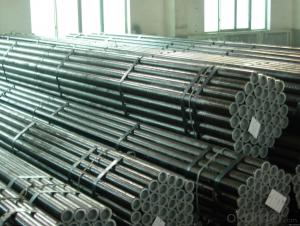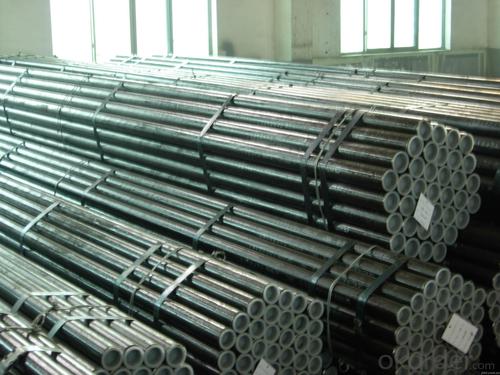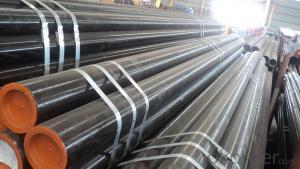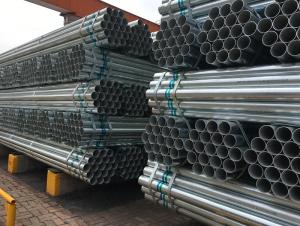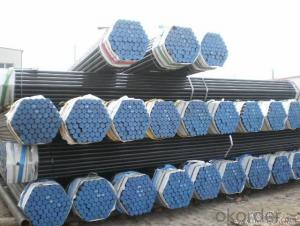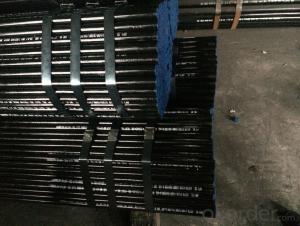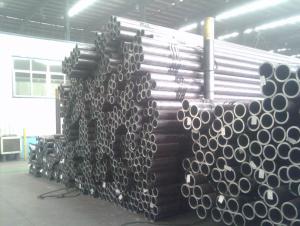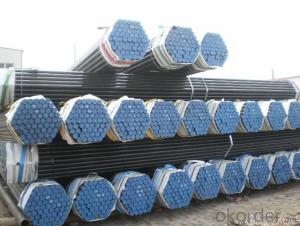Welded ERW Steel Pipe API 5CT Oil Water Gas pipe
- Loading Port:
- China main port
- Payment Terms:
- TT OR LC
- Min Order Qty:
- 30 m.t.
- Supply Capability:
- 7000 m.t./month
OKorder Service Pledge
OKorder Financial Service
You Might Also Like
1、Welded ERW Steel Pipe API 5CT:
API 5CT ERW steel pipe is electric resistance welding, the abbreviation for ERW for transporting oil and natural gas vapor liquid objects, can meet the requirements of high and low pressure, the transport in the world with pipe sector accounted for a pivotal position.
2、Main Features of Welded Black ERW Steel Pipe API 5CT:
• High manufacturing accuracy
• High strength
• Good visual effect
• Reasonable price
• Small inertia resistance
• Strong heat dissipation ability
3、Welded Black ERW Steel Pipe Specification API 5CT:
Standard | GB, DIN, ASTM ASTM A106-2006, ASTM A53-2007 |
Grade | 10#-45#, 16Mn 10#, 20#, 45#, 16Mn |
Thickness | 1 - 33 mm |
Section Shape | Round |
Outer Diameter | 21 - 610mm |
Place of Origin | Tianjin, China (Mainland) |
Secondary Or Not | Non-secondary |
Application | Hydraulic Pipe |
Technique | Cold Drawn |
Certification | API |
Surface Treatment | factory state or painted black |
Special Pipe | API Pipe |
Alloy Or Not | Non-alloy |
Length | 5-12M |
Outer Diameter | 21.3-610mm |
Grade | 20#, 45#, Q345, API J55, API K55, API L80, API N80, API P110, A53B |
Standard | ASME, ASTM |
1) Material:20#(ASTM A 106/A53 GRB.API5LGRB,GB),45#,16Mn,10#.
2) Specification range:OD:21.3-610mm,WT:6-70mm,length:6-12m or according to the requirement of clients.
3) Excutive standards:GB,ASME API5L.ASTM A 106/A53,Despite of the above standards,we can also supply seamless steel pipe with standard of DIN,JIS,and so on,and also develop new products according to the requirements of our clients!
4) Surface:black lacquered,varnish coating or galvanized.
5) Ends:Beveled or square cut,plastic capped,painted.
6) Packing:bundles wrapped with strong steel strip,seaworthy packing.
4、Packaging & Delivery
Packaging Details: | seaworthy package,bundles wrapped with strong steel strip |
Delivery Detail: | 15-30days after received 30%TT |
5、FAQ of Welded Black ERW Steel Pipe API 5CT:
①How is the quality of your products?
Our products are manufactured strictly according to national and internaional standard, and we take a test
on every pipe before delivered out. If you want see our quality certifications and all kinds of testing report, please just ask us for it.
Guaranteed: If products’ quality don’t accord to discription as we give or the promise before you place order, we promise 100% refund.
②How about price?
Yes, we are factory and be able to give you lowest price below market one, and we have a policy that “ for saving time and absolutely honest business attitude, we quote as lowest as possible for any customer, and discount can be given according to quantity”,if you like bargain and factory price is not low enough as you think, just don’t waste your time.Please trust the quotation we would give you, it is professional one.
③Why should you chose us?
Chose happens because of quality, then price, We can give you both.Additionally, we can also offer professional products inquiry, products knowledge train(for agents), smooth goods delivery, exellent customer solution proposals.Our service formula: good quality+good price+good service=customer’s trust
SGS test is available, customer inspection before shipping is welcome, third party inspection is no problem.
6、 Welded Black ERW Steel Pipe Images API 5CT:
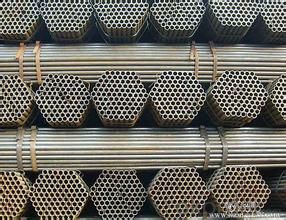
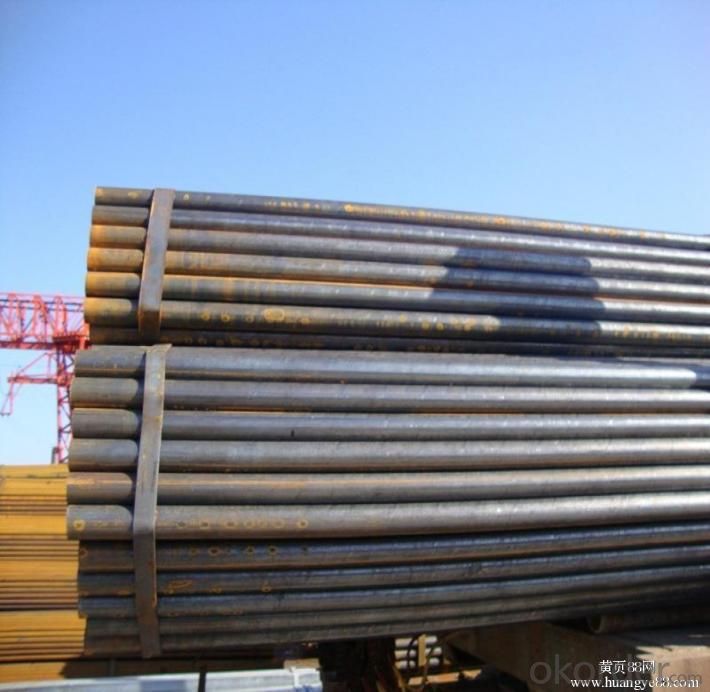
- Q: Are steel pipes suitable for underground compressed air systems?
- Yes, steel pipes are generally suitable for underground compressed air systems. Steel pipes have several advantages that make them a popular choice for such applications. Firstly, steel pipes are known for their high strength and durability, which allows them to withstand the pressure and stress associated with compressed air systems. They can handle high operating pressures without any significant risk of bursting or leaking. Secondly, steel pipes have excellent resistance to corrosion and can withstand exposure to moisture, soil, and other underground elements. This makes them a reliable choice for underground installations, where pipes may be exposed to moisture and other potentially corrosive substances. Furthermore, steel pipes are relatively easy to install and maintain. They can be welded or threaded together, ensuring a secure and leak-free connection. Additionally, steel pipes can be easily inspected and repaired if necessary, allowing for cost-effective maintenance and repairs. However, it is important to note that the suitability of steel pipes for underground compressed air systems may also depend on other factors such as the specific requirements and conditions of the system. It is advisable to consult with a professional engineer or a qualified expert to ensure that steel pipes are the most appropriate choice for a specific application.
- Q: What are the different testing methods for steel pipes?
- Some of the different testing methods for steel pipes include non-destructive testing methods such as ultrasonic testing, magnetic particle testing, and radiographic testing. These methods are used to detect any defects or inconsistencies in the pipe's structure or material without causing any damage. Other testing methods include hydrostatic testing, which involves pressurizing the pipe with water to check for leaks or weaknesses, and mechanical testing, which measures the pipe's strength and durability through tensile, hardness, and impact tests.
- Q: What are the advantages of using steel pipes in plumbing systems?
- There are several advantages of using steel pipes in plumbing systems. Firstly, steel pipes are highly durable and have a long lifespan, making them a reliable choice for plumbing installations. They are resistant to corrosion, rust, and other forms of damage, ensuring the integrity of the plumbing system over time. Additionally, steel pipes have a high tensile strength, allowing them to withstand high pressure and heavy loads without deformation or leakage. They also have excellent heat resistance, making them suitable for hot water and steam applications. Lastly, steel pipes offer a smooth inner surface, minimizing friction and maintaining a consistent flow rate, which is crucial for efficient water distribution and drainage in plumbing systems.
- Q: How are steel pipes used in the electronics industry?
- Steel pipes are commonly used in the electronics industry for various purposes such as cable management, structural support, and conduit systems. They provide a strong and durable solution for organizing and protecting electrical wires and cables. Additionally, steel pipes are utilized in the construction of electronic equipment enclosures and racks, ensuring stability and efficient cooling.
- Q: What is the difference between steel pipes and fiberglass pipes?
- The main difference between steel pipes and fiberglass pipes lies in their composition and properties. Steel pipes are made of metal and are known for their strength, durability, and resistance to high temperatures and pressure. They are commonly used in industrial settings and for transporting liquids and gases. On the other hand, fiberglass pipes are made of glass fibers embedded in a resin matrix, providing them with excellent corrosion resistance, lightweight properties, and insulation capabilities. Fiberglass pipes are often used in applications where corrosion is a concern, such as in chemical processing plants or wastewater treatment facilities.
- Q: How are steel pipes protected against ultraviolet radiation?
- Steel pipes are typically protected against ultraviolet radiation by applying a layer of protective coating or paint. This coating acts as a barrier, preventing the harmful effects of UV rays from deteriorating the steel and reducing its lifespan.
- Q: Can steel pipes be painted?
- Yes, steel pipes can be painted. The process typically involves cleaning and preparing the surface, applying a primer, and then using a suitable paint or coating to achieve the desired finish.
- Q: How are steel pipes used in the construction of wind farms?
- Steel pipes are commonly used in the construction of wind farms to support and secure the wind turbines. These pipes serve as the foundation for the turbines, providing stability and structural integrity. They are used to create the tower structure, which supports the nacelle and rotor blades. Additionally, steel pipes are used for transporting and distributing the electrical cables within the wind farm, ensuring efficient transmission of electricity generated by the turbines.
- Q: How are steel pipes connected to other materials like concrete or plastic?
- Steel pipes are commonly connected to other materials like concrete or plastic through various methods. One common method is through the use of fittings. Fittings are specialized components that facilitate the connection between different materials or pipe sections. These fittings come in various shapes and sizes, such as elbows, tees, reducers, and couplings, and they are designed to provide a secure and leak-proof connection. When connecting steel pipes to concrete, one method is to use concrete anchors. These anchors are embedded into the concrete structure and provide a stable base for securing the steel pipe. The pipe is then attached to the anchor using clamps or brackets. Connecting steel pipes to plastic materials can be achieved through the use of transition fittings. These fittings are specifically designed to join steel pipes with plastic pipes. They typically feature different connection mechanisms on each end, such as threads or compression fittings, allowing for a secure and reliable connection. In some cases, steel pipes can also be connected to other materials using welding techniques. Welding involves melting the ends of the steel and the other material together to create a strong joint. This method is often used for connecting steel pipes to steel structures or components. Overall, the connection of steel pipes to other materials like concrete or plastic requires the use of specialized fittings, anchors, or welding techniques. These methods ensure that the connection is secure, durable, and able to withstand the demands of the application.
- Q: What is the difference between steel pipes and concrete-lined pipes?
- The main difference between steel pipes and concrete-lined pipes lies in their composition and protective features. Steel pipes are typically made entirely of steel, providing strength and durability. On the other hand, concrete-lined pipes consist of a steel pipe coated with a layer of concrete. This lining offers additional protection against corrosion and abrasion. While steel pipes are more suitable for high-pressure applications and offer better resistance to external factors, concrete-lined pipes are commonly used in wastewater systems to prevent corrosion and extend the lifespan of the pipe.
Send your message to us
Welded ERW Steel Pipe API 5CT Oil Water Gas pipe
- Loading Port:
- China main port
- Payment Terms:
- TT OR LC
- Min Order Qty:
- 30 m.t.
- Supply Capability:
- 7000 m.t./month
OKorder Service Pledge
OKorder Financial Service
Similar products
Hot products
Hot Searches
Related keywords
